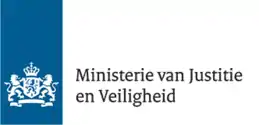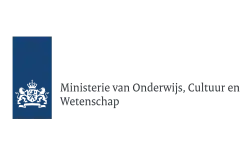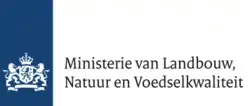Cabinet of the Netherlands
The cabinet of the Netherlands (Dutch: Nederlands kabinet) is the main executive body of the Netherlands. The current cabinet of the Netherlands is the third Rutte cabinet, which has been in power since 26 October 2017. It is headed by Prime Minister Mark Rutte and his deputies Hugo de Jonge, Kajsa Ollongren and Carola Schouten.
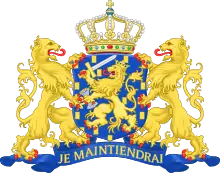 |
|---|
| This article is part of a series on the politics and government of Netherlands |
|
|
Composition and role
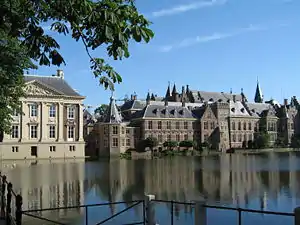
The cabinet consists of the ministers and state secretaries. The cabinet is led by the Prime Minister. There are between twelve and sixteen Ministers, most of whom are also heads of specific government ministries, although there are often some ministers without portfolio who have areas of responsibility inside one or more ministries. For instance there has for some time been a minister for development cooperation, who works within the Ministry of Foreign Affairs. Most ministries also have a state secretary who is responsible for part of the relevant portfolio. State secretaries (such as that of Trade and Development Cooperation) are given the right to call themselves "Minister" in other countries and be treated as such for protocolary purposes, while not having any of the domestic rights given specifically to Ministers. Most significantly, state secretaries are not members of the Council of Ministers.
The policy of a cabinet is coordinated by the Council of Ministers, in which all ministers, including ministers without portfolio, take part. The Council initiates laws and policy. State secretaries do not attend the Council of Ministers unless invited, and even then they have no voting rights in the Council. The Council meets every Friday in the Trêveszaal (the Room of Treaties) in the Binnenhof. Meetings are chaired by the Prime Minister, or an acting Prime Minister if necessary. The Council makes decisions in a collegial manner; all ministers, including the Prime Minister, are (theoretically) equal. Behind the closed doors of the Trêveszaal, ministers can freely debate proposed decisions and express their opinion on any aspect of cabinet policy. Once a decision is made by the Council, all individual members are bound by it and are obliged to support it publicly. A member of Cabinet who is not prepared to publicly support a decision of the Council is obliged to step down. Typically, a good deal of effort is put into reaching relative consensus on any decision. A process of voting within the Council does exist, but is hardly ever used.
Together with the King, the Council of Ministers forms the Government, which makes all the major decisions. In practice, the King does not participate in the daily decision-making of government, although he is kept up to date by weekly meetings with the Prime Minister. The Dutch constitution does not speak of cabinet, but instead only of the Council of Ministers and Government.
The ministers, individually and collectively (as cabinet), are responsible to the States-General for government policy and must enjoy its confidence. It is not possible for a minister to be a member of parliament. Ministers or state secretaries who are no longer supported by a parliamentary majority are also expected by convention to step down. In contrast to the Westminster system, Dutch ministers may not simultaneously also be members of the States-General, although members of the States-General can be appointed as ministers, whereupon their seats become vacant.
An important question is whether the relationship between the cabinet and parliament should be dualistic or monistic. That is, whether ministers and leaders of governing parliamentary parties should prepare important political decisions. According to the dualistic position, members of parliament of governing parties should function independently of the Cabinet. The monistic position, by contrast, is that the Cabinet plays an important role in proposing legislation and policy.
Formation
After a general election held generally every four years, or if a cabinet resigns during a parliamentary term, the process of cabinet formation starts. Because of the multi-party system of the Netherlands, no single party has had a majority in parliament since 1900, and formation of a coalition of two or often three parties is always necessary. This is a time-consuming process. The entire procedure is regulated by tradition and convention, with only the final appointment process specified by law.
Initially, the Dutch Monarch has secret individual meetings with the presidents of the Senate and House of Representatives, and the Vice-President of the Council of State. Next the Monarch has a meeting with the leader of each parliamentary party in the House of Representatives. This is followed by appointing an informateur who explores the options of a new cabinet. The informateur is often a relative outsider and a veteran politician, who has retired from active politics, perhaps a member of the Senate or Raad van State, though by convention he or she has a background in the largest party in the House of Representatives. The Monarch may appoint multiple informateurs, with backgrounds in other parties. The informateur is given a specific task by the King or Queen regnant, often to "seek a coalition of parties with programmatic agreement and a majority in parliament." The informateur has one-on-one meetings with the leaders of the parliamentary parties, and chairs sessions of negotiations between the chairs of parliamentary parties as they compromise in order to achieve agreement. If negotiations break down, a new informateur is appointed and the information process begins afresh.
Once an informateur is successful, the Monarch appoints the formateur, conventionally the leader of the largest party in the prospective coalition and the likely Prime Minister. He or she leads any remaining negotiations between those parties willing to cooperate to form a cabinet. Often, these negotiations cover the details of the program of policies, the composition of the Cabinet, and the division of Ministerial portfolios.
If the formateur is successful, the Monarch appoints all ministers and state secretaries individually by Royal Decision (Koninklijk Besluit). Each Minister privately swears an oath of loyalty to the Constitution. After this the entire Council of Ministers and the King or Queen regnant are photographed on the stairs of the palace Huis ten Bosch during the bordes scene. The new cabinet then proposes its plans to parliament.
Between the dissolution of the States-General before general elections and the appointment of a new Cabinet, the incumbent Cabinet is termed demissionair, that is, a caretaker government limiting itself to urgent and pressing matters and traditionally not taking any controversial decisions. If a Cabinet falls during a parliamentary term because one of the coalition partners withdraws its support, the coalition partner in question may leave. This does not result in a demissionair Cabinet, unless the Prime Minister is granted a dissolution of the States-General. Instead, the remaining parties in the governing coalition form a rompkabinet ("rump cabinet"). If the parties do not between them control a majority of the House of Representatives, the Cabinet continues as a minority government.
The formation is often considered as important as or even more important than the elections themselves. Because of the importance of negotiations, which can lead to policies that no party has promoted during the election, cabinet formations are sometimes seen as undemocratic. Recently it was attempted to make the process more democratic, with the formateur and informateur accounting for their actions before both the House of Representatives and the Dutch Monarch. Another source of discontent with this process is the role of the monarch in it.
Incumbent Cabinet
| Ministers | Title | Term of office | Party | |||
|---|---|---|---|---|---|---|
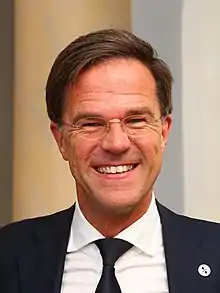 |
Drs. Mark Rutte (born 1967) |
Prime Minister | 14 October 2010 – Incumbent (retained)[lower-roman 1] |
VVD | ||
| Minister of General Affairs | ||||||
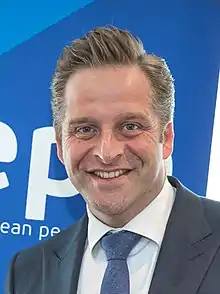 |
Hugo de Jonge (born 1977) |
First Deputy Prime Minister | 26 October 2017 – Incumbent |
CDA | ||
| Minister of Health, Welfare and Sport | ||||||
.jpg.webp) |
Jkvr. Drs. Kajsa Ollongren (born 1967) |
Second Deputy Prime Minister | 26 October 2017 – 1 November 2019 (on leave)[lower-roman 2] |
D66 | ||
.jpg.webp) |
Drs. Wouter Koolmees (born 1977) |
1 November 2019 – 14 May 2020 (acting)[lower-roman 3] | ||||
.jpg.webp) |
Jkvr. Drs. Kajsa Ollongren (born 1967) |
14 May 2020 – Incumbent | ||||
.jpg.webp) |
Drs. Carola Schouten (born 1977) |
Third Deputy Prime Minister | 26 October 2017 – Incumbent |
CU | ||
| Minister of Agriculture, Nature and Food Quality | ||||||
.jpg.webp) |
Drs. Halbe Zijlstra (born 1969) |
Minister of Foreign Affairs | 26 October 2017 – 13 February 2018 (resigned) |
VVD | ||
.jpg.webp) |
Sigrid Kaag MA, MPhil (born 1961) |
13 February 2018 – 7 March 2018 (ad interim) |
D66 | |||
.jpg.webp) |
Drs. Stef Blok (born 1964) |
7 March 2018 – Incumbent |
VVD | |||
.jpg.webp) |
Mr. Dr. Ferdinand Grapperhaus (born 1959) |
Minister of Justice and Security | 26 October 2017 – Incumbent |
CDA | ||
.jpg.webp) |
Jkvr. Drs. Kajsa Ollongren (born 1967) |
Minister of the Interior and Kingdom Relations | 26 October 2017 – 1 November 2019 (on leave)[lower-roman 2] |
D66 | ||
_(45117150741)_(cropped)_2.jpg.webp) |
Drs. Raymond Knops (born 1971) |
1 November 2019 – 14 April 2020 (acting)[lower-roman 3] |
CDA | |||
.jpg.webp) |
Jkvr. Drs. Kajsa Ollongren (born 1967) |
14 April 2020 – Incumbent |
D66 | |||
.jpg.webp) |
Mr. Drs. Ingrid van Engelshoven (born 1966) |
Minister of Education, Culture and Science | 26 October 2017 – Incumbent |
D66 | ||
.jpg.webp) |
Mr. Wopke Hoekstra MBA (born 1975) |
Minister of Finance | 26 October 2017 – Incumbent |
CDA | ||
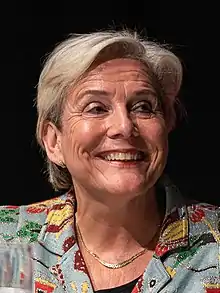 |
Drs. Ank Bijleveld (born 1962) |
Minister of Defence | 26 October 2017 – Incumbent |
CDA | ||
.jpg.webp) |
Drs. Cora van Nieuwenhuizen (born 1963) |
Minister of Infrastructure and Water Management | 26 October 2017 – Incumbent |
VVD | ||
.jpg.webp) |
Ir. Eric Wiebes MBA (born 1963) |
Minister of Economic Affairs and Climate Policy | 26 October 2017 – 15 January 2021 (resigned) |
VVD | ||
.jpg.webp) |
Drs. Cora van Nieuwenhuizen (born 1963) |
15 January 2021 – 20 January 2021 (ad interim) | ||||
| Bas van 't Wout (born 1979) |
20 January 2021 – Incumbent | |||||
.jpg.webp) |
Drs. Wouter Koolmees (born 1977) |
Minister of Social Affairs and Employment | 26 October 2017 – Incumbent |
D66 | ||
| Ministers without portfolio | Title | Term of office | Party | |||
.jpg.webp) |
Sigrid Kaag MA, MPhil (born 1961) |
Minister for Foreign Trade and Development Cooperation
within Foreign Affairs |
26 October 2017 – Incumbent |
D66 | ||
.jpg.webp) |
Drs. Sander Dekker (born 1975) |
Minister for Legal Protection
within Justice and Security |
26 October 2017 – Incumbent |
VVD | ||
.jpg.webp) |
Drs. Arie Slob (born 1961) |
Minister for Primary and Secondary Education and Media | 26 October 2017 – Incumbent |
CU | ||
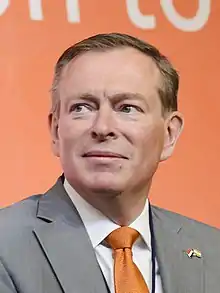 |
Mr. Drs. Bruno Bruins (born 1963) |
Minister for Medical Care and Sport
within Health, Welfare and Sport |
26 October 2017 – 19 March 2020 (resigned) |
VVD | ||
.jpg.webp) |
Drs. Martin van Rijn (born 1956) |
23 March 2020 – 9 July 2020 (ad interim) |
Indep. [lower-roman 4] | |||
.jpg.webp) |
Drs. Tamara van Ark (born 1974) |
9 July 2020 – Incumbent |
VVD | |||
 |
Drs. Ank Bijleveld (born 1962) |
Minister for the General Intelligence and Security Service | 1 November 2019 – 14 April 2020 (acting)[lower-roman 3] |
CDA | ||
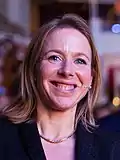 |
Drs. Stientje van Veldhoven (born 1973) |
Minister for Environment and Housing | 1 November 2019 – 14 April 2020 (acting)[lower-roman 3] |
D66 | ||
| State Secretaries | Title | Portfolio | Term of office | Party | ||
.jpg.webp) |
Mark Harbers (born 1969) |
State Secretary for Justice and Security (Minister for Migration)[lower-roman 5] |
|
26 October 2017 – 21 May 2019 (resigned) |
VVD | |
.jpg.webp) |
Mr. Ankie Broekers-Knol (born 1946) |
11 July 2019 – Incumbent | ||||
_(45117150741)_(cropped)_2.jpg.webp) |
Drs. Raymond Knops (born 1971) |
State Secretary for the Interior and Kingdom Relations |
|
26 October 2017 – 1 November 2019 (appointed)[lower-roman 6] |
CDA | |
| 14 April 2020 – Incumbent | ||||||
.jpg.webp) |
Mr. Menno Snel (born 1970) |
State Secretary for Finance |
|
26 October 2017 – 18 December 2019 (resigned) |
D66 | |
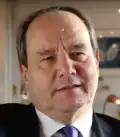 |
Dr. Hans Vijlbrief (born 1963) |
|
29 January 2020 – Incumbent | |||
.jpg.webp) |
Drs. Alexandra van Huffelen (born 1968) |
|
29 January 2020 – Incumbent | |||
.jpg.webp) |
Drs. Barbara Visser (born 1977) |
State Secretary for Defence |
|
26 October 2017 – Incumbent |
VVD | |
 |
Drs. Stientje van Veldhoven (born 1973) |
State Secretary for Infrastructure and Water Management |
|
26 October 2017 – 1 November 2019 (appointed)[lower-roman 7] |
D66 | |
| 14 April 2020 – Incumbent | ||||||
.jpg.webp) |
Mr. Drs. Mona Keijzer (born 1968) |
State Secretary for Economic Affairs and Climate Policy |
|
26 October 2017 – Incumbent |
CDA | |
.jpg.webp) |
Drs. Tamara van Ark (born 1974) |
State Secretary for Social Affairs and Employment |
|
26 October 2017 – 9 July 2020 (appointed)[lower-roman 8] |
VVD | |
| Bas van 't Wout (born 1979) |
9 July 2020 – 20 January 2021 (appointed)[lower-roman 9] | |||||
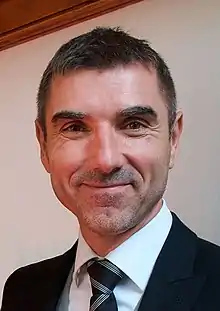 |
Drs. Paul Blokhuis (born 1963) |
State Secretary for Health, Welfare and Sport |
|
26 October 2017 – Incumbent |
CU | |
| Source: Rijksoverheid, Members of the government | ||||||
- Retained this position from the previous cabinet.
- Kajsa Ollongren took an extended medical leave of absence on 1 November 2019.
- Served in an acting capacity due to the medical leave of absence of Kajsa Ollongren.
- Martin van Rijn is a member of the Labour Party, but joined the cabinet independently as Minister for Medical Care (ad interim).
- Allowed to use the title "Minister of Migration" while on foreign business.
- Raymond Knops was appointed Minister for the Interior and Kingdom Relations (acting) on 1 November 2019.
- Stientje van Veldhoven was appointed Minister for Environment and Housing (acting) on 1 November 2019.
- Tamara van Ark was appointed Minister for Medical Care on 9 July 2019.
- Bas van 't Wout was appointed Minister of Economic Affairs and Climate Policy on 20 January 2021.
Ministries
There are now twelve ministries, all with their own Minister, there are also several Ministers without portfolio and in some ministries there is a State Secretary next to the Minister. The number of Ministers and State Secretaries and the division of their tasks may vary somewhat from one cabinet to another. The ministries are:
History
The first real cabinet was formed in 1848 after a constitution was adopted which limited the power of the King and introduced the principle of ministerial responsibility to parliament. Until 1888 cabinets lacked a real coordinating role, and instead ministers were focused on their own department. After 1888 cabinets became more political.
Of the thirty coalition governments since World War II, only three excluded the largest party (all three times PvdA) and the largest number of parties in a coalition was 5 (in 1971 and 1973). After that, the three major Christian-democratic parties merged into CDA, and 2- or 3-party coalitions became standard.
Since 1945 there have been thirty cabinets, which were headed by 15 Prime Ministers. Willem Drees and Jan Peter Balkenende both chaired the most cabinets (four) and Ruud Lubbers served as Prime Minister the longest (between 1982 and 1994). The second Rutte cabinet was the longest lasting cabinet since World War II (1,816 days); only the cabinet led by Theo Heemskerk sat longer (2025 days). The first Balkenende cabinet is the shortest lasting normal cabinet since World War II (87 days); only the fifth cabinet of Hendrikus Colijn lasted shorter (10 days).
Council of Ministers of the Kingdom
The Cabinet of the Netherlands also takes responsibility for day-to-day affairs in the Kingdom of the Netherlands, which is distinct from the Netherlands, as it also includes the Netherlands Antilles and Aruba. If affairs are decided which are of vital importance of the Kingdom as a whole, the Council of Ministers of the Netherlands is joined by one Minister Plenipotentiary for Aruba and one for the other Antilles to form the Council of Ministers of the Kingdom.
Types
There are different types of cabinets:
- A demissionary cabinet (demissionair kabinet) is a caretaker government during the election campaign and the formation of a new cabinet.
- An extra-parliamentary cabinet (extraparlementair kabinet) not based on a parliamentary majority. The last extra-parliamentary cabinet was the Den Uyl cabinet. It consisted of members of the three progressive parties (the social democratic PvdA, the social liberal D66, and the progressive Christian PPR) and progressive members from the Christian democratic ARP and KVP. It is contrasted with a parliamentary cabinet, which does have an explicit majority in parliament.
- A rump cabinet (rompkabinet) is the continuation of a Dutch cabinet when it has lost a coalition partner, typically a form of minority government, where the cabinet has not become demissionary, but seeks support from a majority of parliament to finish the work that was already introduced by the cabinet to the parliament. Normally the Dutch Monarch will call for dissolution of parliament somewhat later, since the basis behind the coalition agreement is gone.
- A broad basis cabinet (brede basiskabinet) is an oversized coalition or national cabinet. Between 1945 and 1959, several cabinets have included more parties than were necessary for a parliamentary majority. The first one of which was the Schermerhorn cabinet. Other parties were included to give the cabinet and its far-reaching proposals, like the formation of a welfare state, a broad basis in parliament and society. The core of these cabinets were formed by the social democratic PvdA and the catholic KVP, the Roman/Red alliance which by themselves had a large majority in parliament.




